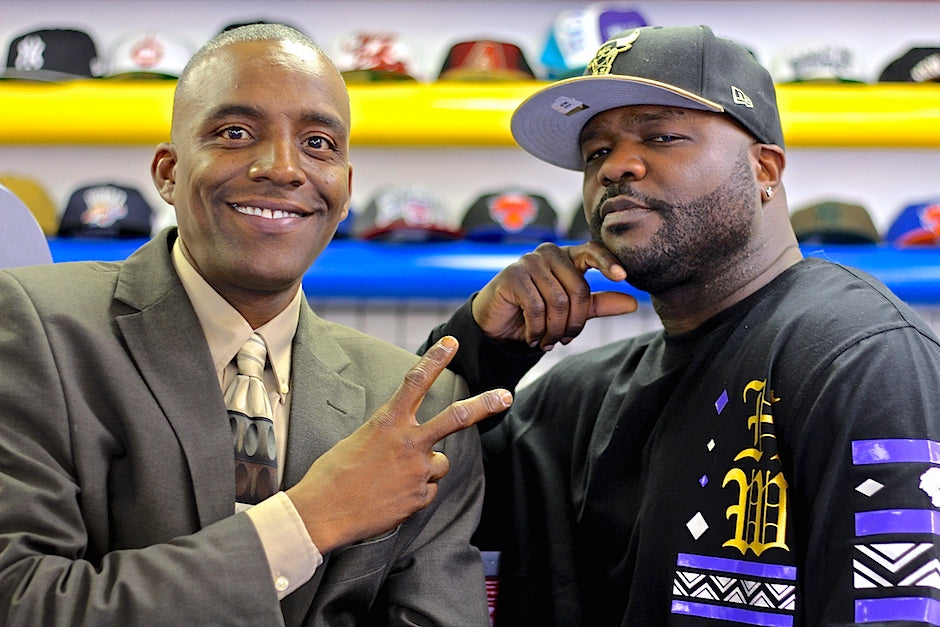Pepe Vega and Hugh “HG” Gallman grew up in “The Tribe,” a housing project that once stood in the Dixwell neighborhood. Eventually torn down, Dixwell’s projects were notorious for disrepair and crime. “It was piss in the hallways and broken elevators,” says Gallman. “When it feels like people stop caring then you don’t care anymore either.”
As teenagers, Vega and Gallman started a rap group called Medicine and became local celebrities with their 1997 single “Money Don’t Make You”. Even then, film was on Vega’s mind; he dreamed of writing and directing movies under the name Pressure Point. “I used to love karate movies,” says Vega, “and I liked the idea of pressure points.” In 2004, Vega’s vision took on flesh and blood when his Pressure Point Productions—not to be confused with Pressure Point Films, another indie film house based in Connecticut—began filming Homecoming, a feature length comedy about an outrageous cross-country road trip.
Pressure Point is far from Hollywood, in more ways than the one. All of the actors, cameramen and assistants it enlists are local volunteers, most of whom have never spent time on a professional film set. “HG is usually our main actor,” he says. “Rodney Moore is my right-hand man.” As the primary scriptwriter and director and often the producer as well, the ideas driving the films are largely Vega’s.
sponsored by
Vega and Moore hold positions with the New Haven Family Alliance as street outreach workers for at-risk youth. If a punch is thrown, they try to prevent the second one. If a bullet strikes, they show up at the hospital to stop a vendetta killing before it begins.
Pressure Point Productions embodies that same spirit, Vega says. It gives disadvantaged young people a chance to be part of something they can be proud of. There are those who wouldn’t trust these kids in an electronics store or even expect them to want to read, much less hand them a film camera or give them a part in a script. Appearing on screen “is a fantasy,” says Vega, one that supports them for having valuable skills and pursuits in real life. “If you’re an athlete, you can be in the film… If you’re a musician, you can be in the film.”
With their second feature, Halfway House, Pressure Point’s showrunners showed how far they were willing to extend a hand to their community, and how responsive that community could be. “Hundreds—we’ve had hundreds of people come help,” says Vega. During a pre-screening, before the film was fully edited, they even took suggestions from the audience about how post-production should go.
sponsored by
Pressure Point’s films are an unusual mixture of dark comedy and drama taking on themes and subjects that resonate particularly well with black audiences. Halfway House, for example, deals with an all-too-common situation for black men: the limbo between prison and home.
The NSFW trailer, which contains explicit language and partial nudity, is long enough to give you a sense of that and more. It opens on Geech Glenn being released from prison ten years after a wrongful conviction, only to find he’s got another eight months to spend at “the craziest halfway house on Earth.” Then it jumps around frenetically, teasing a huge range of characters, relationships and situations.
You can glean some of the filmmaking endeavor’s structural details as well. The sound editing in the trailer is uneven, and a few of the actors aren’t very convincing, speaking to the community-driven nature of the project. But other performers are quite believable, and though the verite-style camera work often misses the “ideal” framing, that’s a strength. It makes things feel real and visceral.
Right now, Pressure Point Productions is looking for a lucky break. Vega and Moore are scraping together the money to finish the post-production of Halfway House. They hope to secure a network deal or a spot in your Netflix queue. If they hit pay dirt, they’ll probably move the company to Atlanta, but even if they head south, they won’t forget to look back, according to Vega.
“We’d probably keep a recruitment office open in New Haven,” he says. “Take a kid getting into trouble all the time, put him in front of a camera and you realize, ‘Damn, he can really act.’ People gave us shots when we were growing up, we want to give them shots.”
Written and photographed by Daniel Shkolnik. To contact Pressure Point, email pressurepointproductions1@gmail.com.










